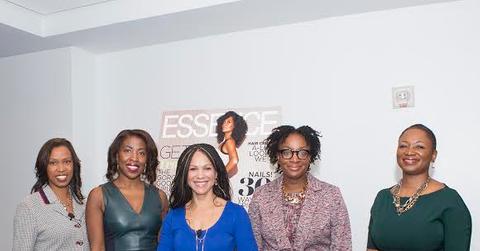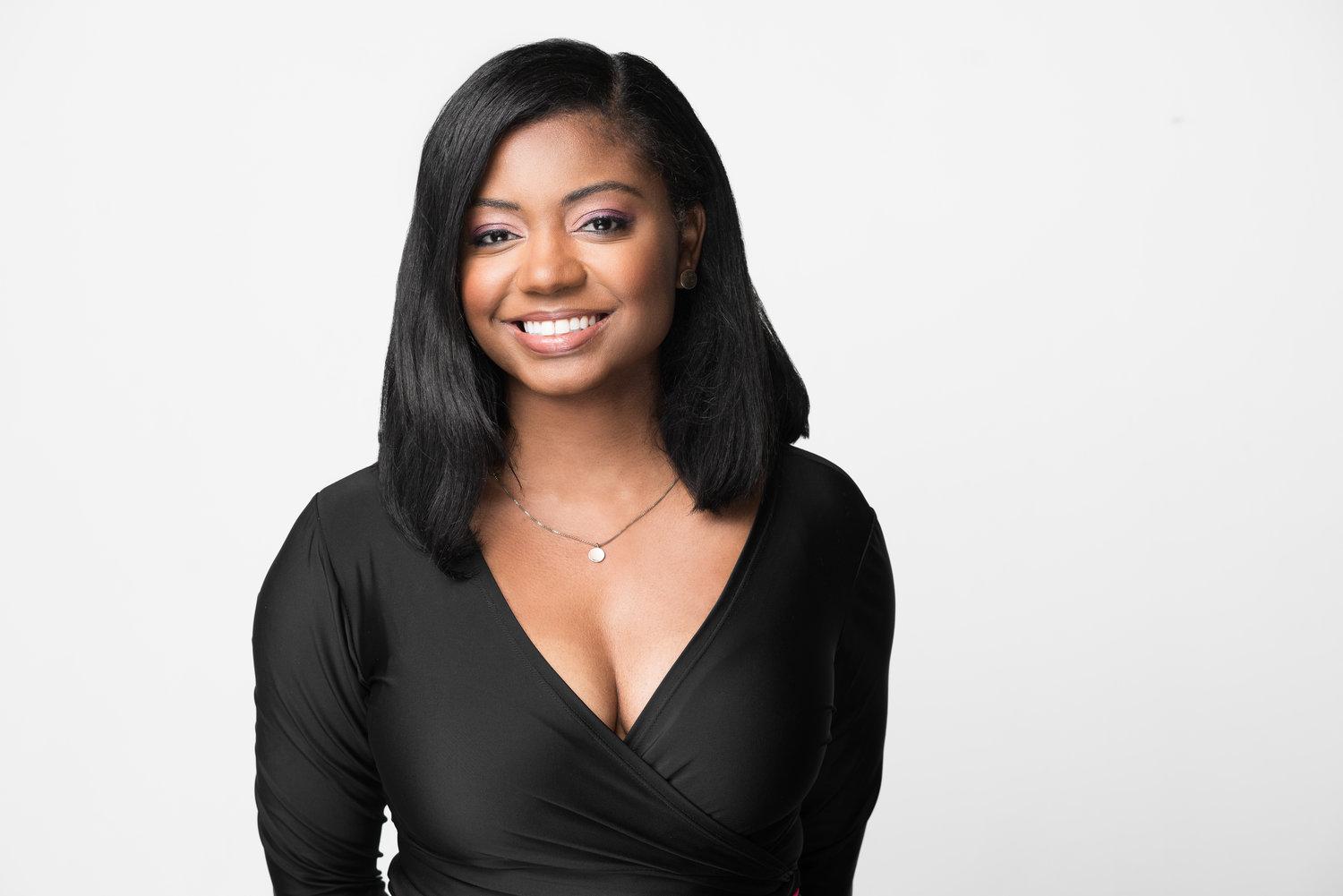ESSENCE Magazine Takes A Closer Look At The Challenges For Black Women At Work

ESSENCE’s Black Women at Work panelists: Nailah Flake-Brown, Managing Director, Morgan Stanley; Shawn Outler, Senior Vice-President, Macy’s; MSNBC host and ESSENCE contributor Melissa Harris-Perry (who also served as event moderator); Wanji Walcott, Managing Counsel, American Express; and ESSENCE Editor-in-Chief Vanessa De Luca. | photo credit: Michael Rowe
At an invite-only panel last Friday, ESSENCE Magazine revealed highlights from their Black Women at Work study focusing on the specific set of challenges Black women face when it comes to achieving success in the workplace.
To date, there are just four Black Fortune 500 CEOs. Among them, just one is a woman. According to the Center for American Progress, just 5.3 percent of managerial and professional positions are occupied by Black women. Further, women of color hold only 3.2 percent of board seats at Fortune 500 companies.
“Many times, being Black and female can create a uniquely complicated work environment for African-American women,” explained Editor-in-Chief Vanessa De Luca in her opening remarks. “Today we lead all U.S. women in labor force participation rates, yet even in 2015, Black women still encounter systemic hurdles throughout their careers that continue to perpetuate feelings of inequality and discrimination.”
There’s no doubt, conversations about women in the workplace have reached an all time high. The conversations more or less have been dominated by the concept of leaning in, and closely coupled with the critique that for women of color, the path to moving ahead isn’t quite the same for Black women in comparison to their White counterparts. ESSENCE Magazine commissioned this study in partnership with Added Value Cheskin, and discussed these issues in real time during a Black Women @ Work luncheon panel.
The panel was moderated by professor and MSNBC host Melissa Harris-Perry, and included Wanji Walcott, Managing Counsel for American Express; Nailah Flake-Brown, a Managing Director at Morgan Stanley; and Shawn Outler, a Senior Vice President at Macy’s.
“Have a mentor you know that you can speak to but that you need to get ahead in your career,” explained Flake-Brown in response to Harris-Perry’s opening question about the value of mentors and role models. The panelists all agreed that mentors are important and for many of them the mentorship and modeling started for them at home.
Naturally, the conversation moved then to the importances of sponsors. “It’s about those people who can speak on you when you’re not in the room,” explained Outler.
However, often for Black women it’s difficult for them to find those key sponsors and mentors in the workplace. This is connected with the idea that Black women have a “heightened sense of awareness in the workplace. They are vigilant about dispelling stereotypes because they want to be respected and taken seriously.”
As the conversation revealed, these actions can cause many Black women to be too distant in their effort to be professional to the point where people feel as though they cannot connect with them. Walcott, Managing Counsel for American Express reflected on this point. She said she found it difficult to get constructive feedback and was always simply told she was doing a good job. When she finally did get some feedback she was shocked.
“A boss told me that I didn’t emote enough. My thought was, ‘You don’t want to see me emote because that could be bad for you,’” Walcott said with a slight laugh. Essentially she was alluding to the ‘angry/sassy black woman stereotype’ that many Black women in professional corporate environments work to avoid. Thus, tempering their emotions.
ESSENCE’s study found that “when you (Black women) let your guard down and allow bosses and colleagues to see your distinct qualities, they’ll become more comfortable around you and get a better sense of your strengths. That often leads to more visible projects, raises and promotions.” 39 percent of Black women executives want to be known as Inspiring Stars, women who take risks, open up, and share traits that make them different. Yet, 70 percent of Black women fear being labeled an “Angry Black Woman.”
“There’s a balance between anger aggression and assertiveness,” explained Outler.
This negative stereotype impacts Black women’s comfortability level in expressing aspect of their identities. The ESSENCE study found that 80 percent of Black women feel adjustments are necessary to be successful at work versus just 62 percent of non-Hispanic White women. Instead, the study found that Black women tend to project the least threatening stereotype the “Articulated Girl Next Door” defined as a professional woman who is safe and adaptable.
“The question really is how do you make that connection with others who may not be just like you,” explained Outler when reflecting on her own experiences during the panel. “There are lots of opportunities to build sponsorships and relationships if you share your personality.” Flake-Brown then chimed in stating that sometimes simply lifting our heads up and having the confidence to start or join into a conversation can be enough to break down barriers and build interpersonal connections.
Following the line of perceptions in the workplace and managing those perceptions the conversations moved the complications of managing Black hair, and natural hair in the workplace. Every executive had a different type of experience with that area from being natural their whole life to dealing with the awkward conversations about “how they got their hair ‘like that.’”
Outler who recently transitioned to natural hair admitted she struggles with how to deal with her hair on a day to day. “So I’ve gone to work testing the curly hair, the straight, the twists, and those conversations take a long time when co-workers ask me what I do with my hair….Sometimes you just want to go to work and do your job, and it takes up a lot of time explaining to everyone what you did to your hair.”
Harris-Perry then brought the conversation to the various micro-aggressions and plain old racist statements Black people tend to hear, or over hear in the corporate world. In many cases, rather than confront the commenter, the response is to simply redirect.
Walcott was reminded of an incident that happened in her superior’s office a few years ago. “I saw a huge bug in my superior’s office years ago. He opened the door to let it go out, but I told him he needed to kill it. He stepped on it, then he said, ‘I don’t know what you’re so worried about. Your ancestors used to eat those,’” the entire room gasped at this story.
While Walcott’s experience is an extreme example, microaggressions and various scenarios that stride the line of discrimination impact black women in a unique way as they are a “double-minority.” They can find themselves as not just the only woman in the room, but sometimes the only black person as well amplifying the perception of “other.”
“I’ve had instances where I was the only Black woman in the room, and people would stare. Now I like the attention!” expressed Flake-Brown.
According to ESSENCE, Black women lead in labor force participation yet still lag behind in progress compared to our counterparts. Despite the barriers and biases, ESSENCE found Black women “have a great deal of confidence in their career credentials and they approach work with optimism, confidence, positivity and determination.” 44 percent of Black women feel they are developing skills that will help them get to the next level compared to 23 percent of non-Hispanic White women. 32 percent of Black women want to become an executive or manager in their current industries compared with 18 percent of non-Hispanic White women.
So, for Black women with the goal of climbing the corporate ladder, more personal expression, building key relationships with mentors and sponsors in addition to taking calculated risks can help them get to the next level.
Check out the Storify below to see how the conversation unfolded in real time:






